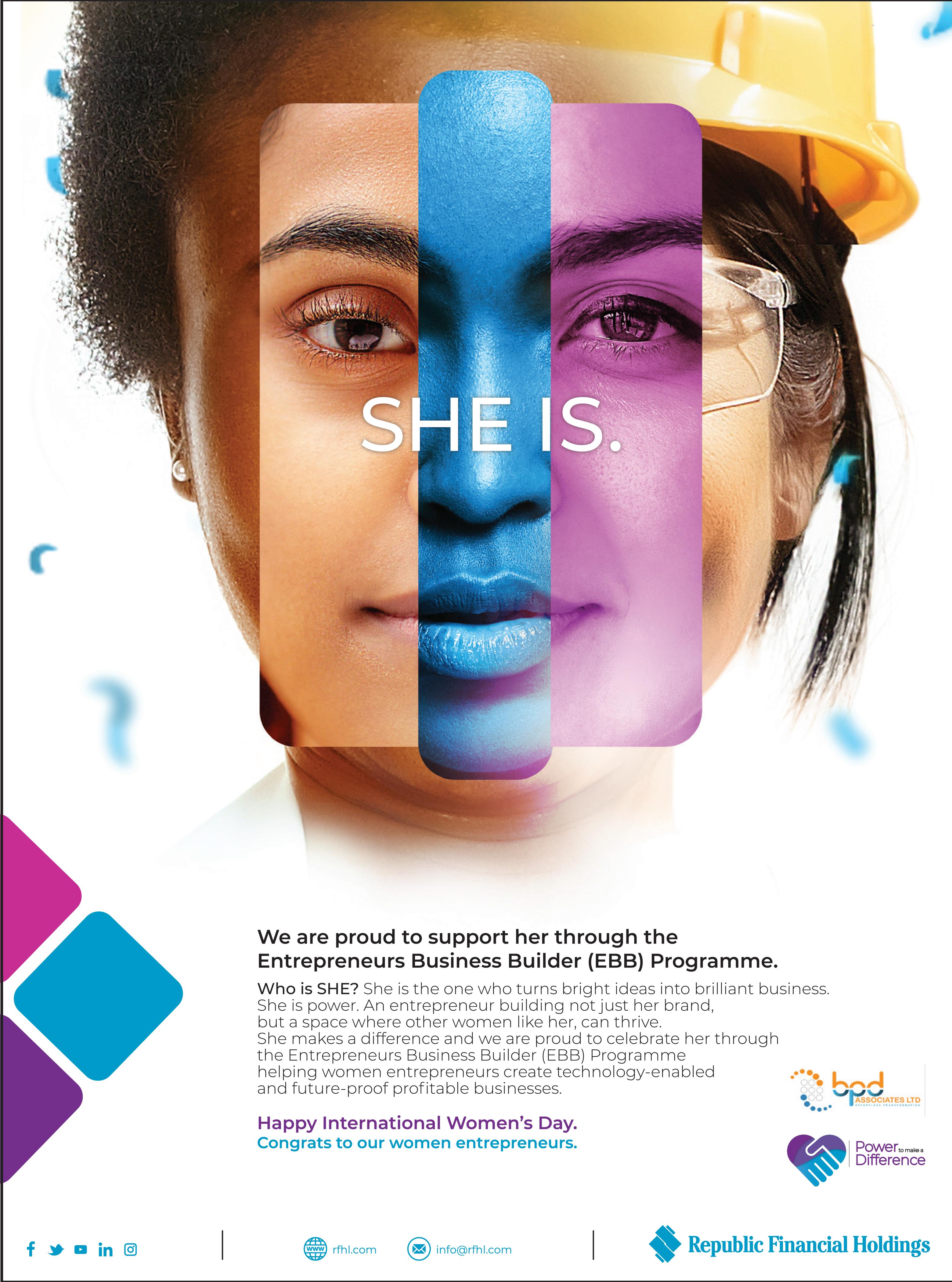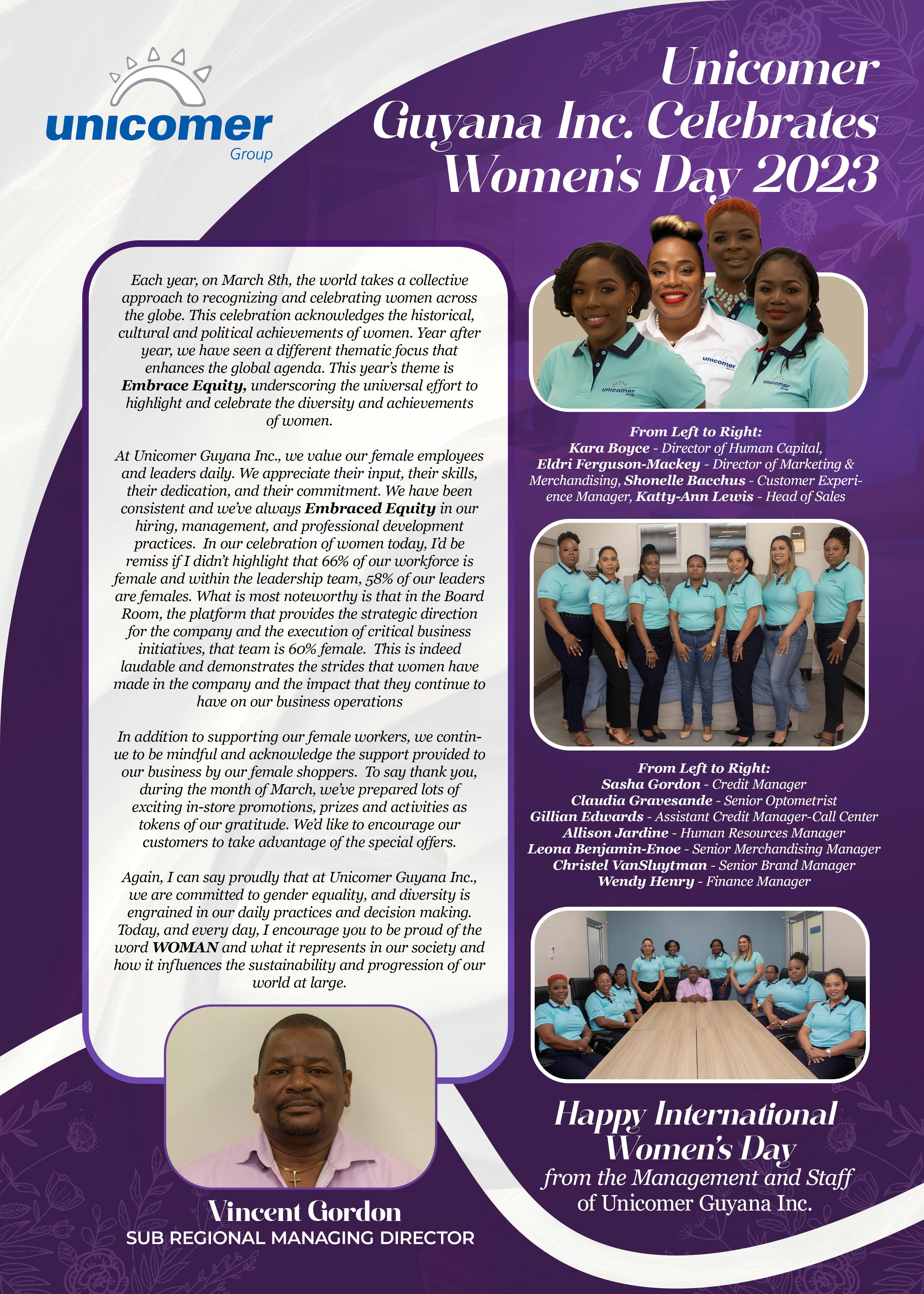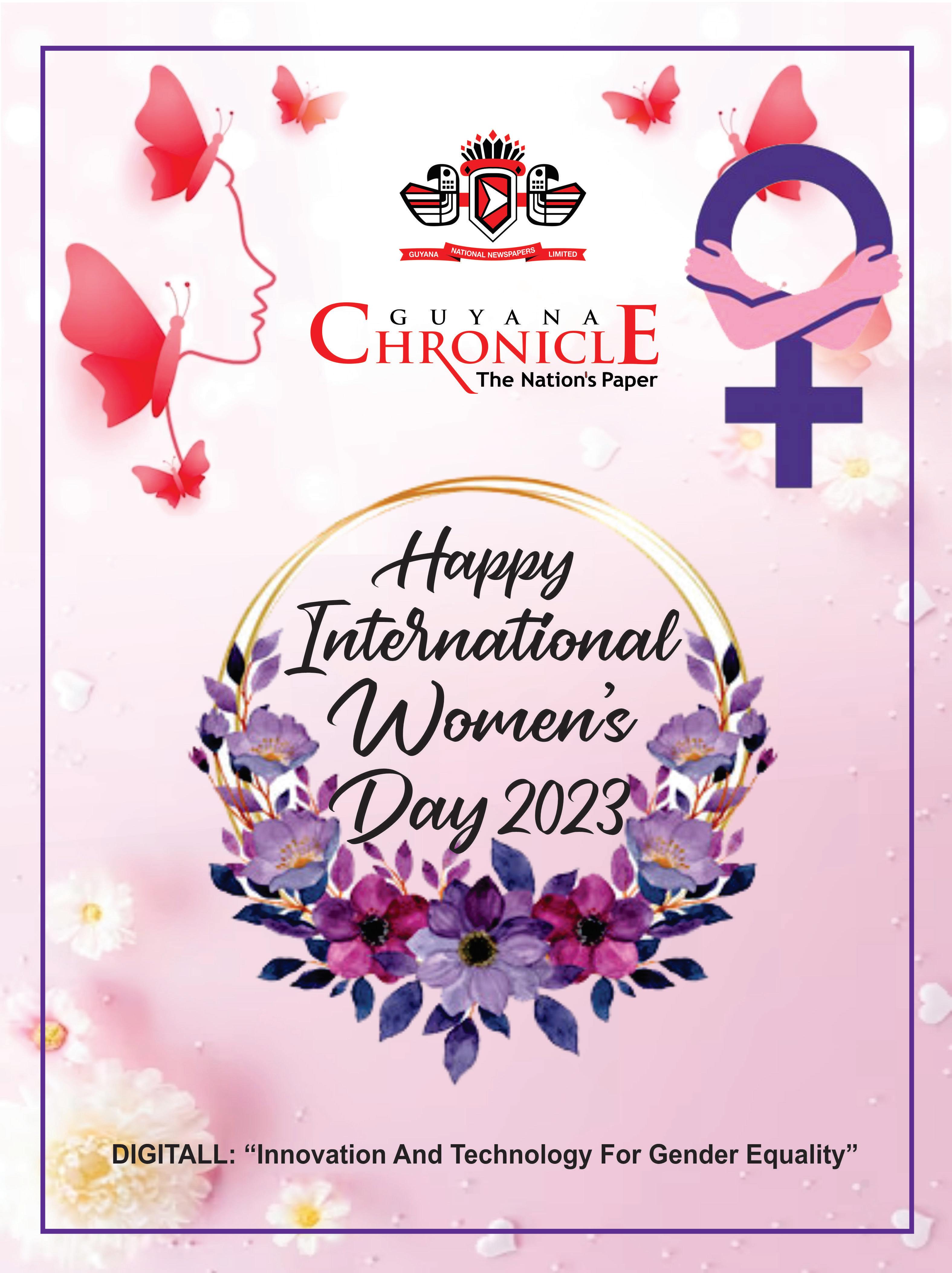
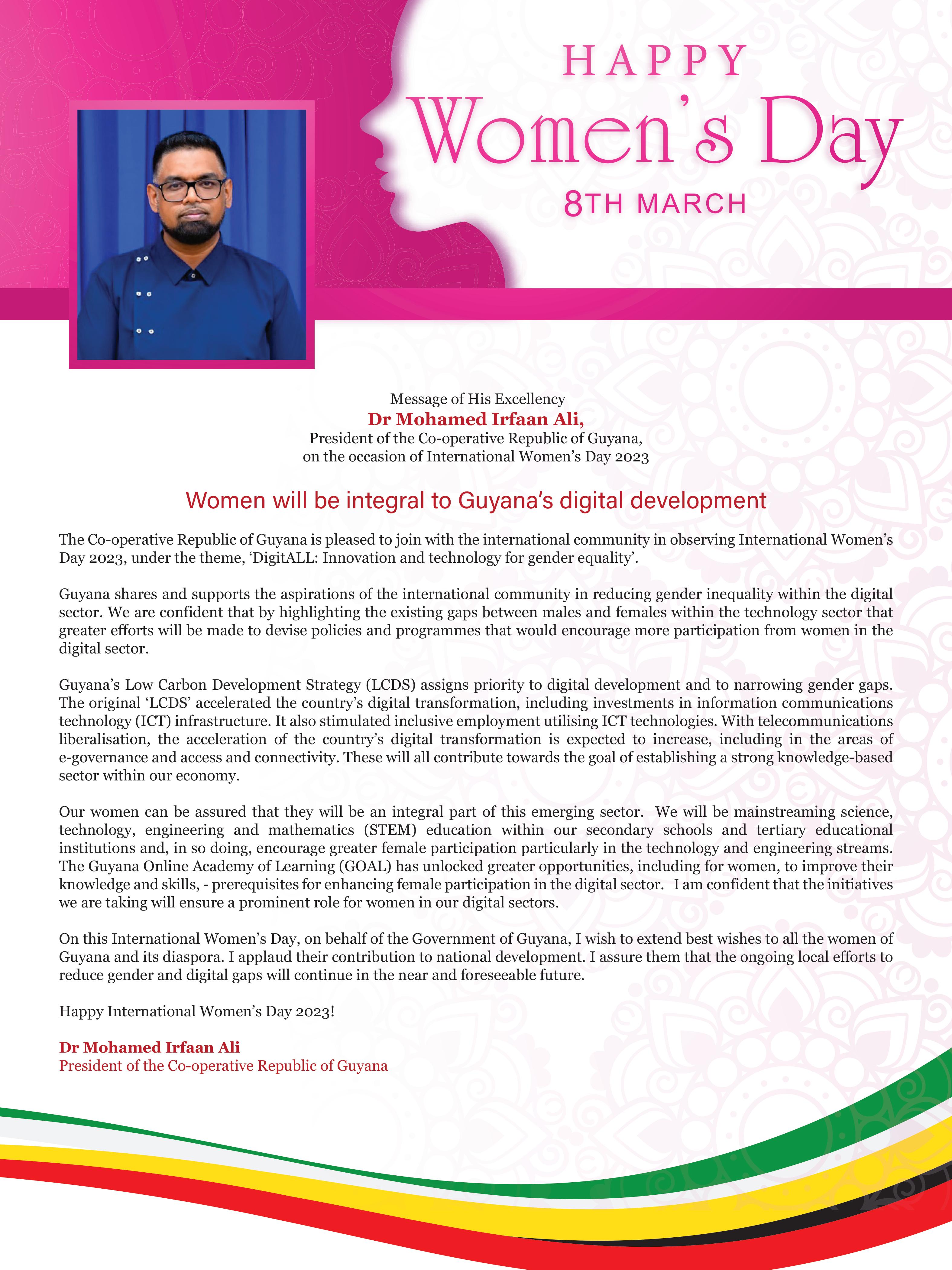



experience in the sector, Ferrell said she applied without even thinking if she would get any feedback.
To her surprise, Ferrell said she got the position and quickly excelled. However, she was quickly promoted to lead its subsidiary, El Dorado Offshore.
She related that the sector is filled with opportunities for women, especially at their logistics company.

“We don’t discriminate in any position; we have female
By Clestine Juanhealth and safety superintendents. We have female stewards offshore; we have cooks that are female offshore. So, any opportunity that arises, a female can apply for,” she said. The company also provides training if the applicant lacks the necessary skills to complete tasks.
“We do facilitate that to ensure that persons have the
WOMEN have made significant strides in the oil and gas industry in recent years. Not only are they contributing to the industry’s success, but they are also breaking down barriers and encouraging more women to enter the field.
The industry benefits from the diverse perspectives and talents that women bring to the table, like 37-year-old Sherry Ferrell, who is the Head of El Dorado Offshore Guyana - one of the leading manpower and recruitment companies in the Caribbean.


This “country girl” grew up in Region Three and began teaching at the tender age of 17, while also being a ‘Sunday School’ teacher at her church.
“I believe those two careers would have moulded me to find the HR part. I genuinely love people. Like anywhere that I would have worked, people always refer to me as the mother of the company or somebody that they can always go to.
“I believe that I have a lot of empathy towards people and situations. So it’s easy for people to talk to me,” Ferrell said during an interview with the Guyana Chronicle.
She related that the career path was not deliberate, but the journey was worth the adventure.
Currently, she holds a bachelor’s degree in business management from the University of Guyana and a master’s in Human Resource Management from the University of the West Indies.
Aside from her professional endeavours, Ferrell enjoys spending time with her fiancé, travelling, volunteering, and giving back to her community.
She worked at the Environmental Protection Agency as an HR officer and Texilia American University also.
But no matter her role, she quickly outgrew the environment since she knew she was destined for more.
“I was looking for something different because I felt like there was nothing more that I could do. One thing about me is if I feel like I’m not being useful somewhere, I want to move,” she said.
Ferrell said that one of her friends saw a vacancy for an HR manager at a logistics company in the Oil and Gas sector and pleaded with her to apply.
While she might have been deterred by not having any
FROM the midwives of ancient times to surgeons, women have always had a key role to play in the advancement of medicine.
While there are more men in the profession, the history of women in medicine is long and wide, and in Guyana, there are several young women who are not only occupying leadership roles but are paving the way for greater inclusivity of women in the wide ranging field of medical science.

One such young woman is Dr. Andrea Kissoon, head resident at the Georgetown Public Hospital Corporation (GPHC).
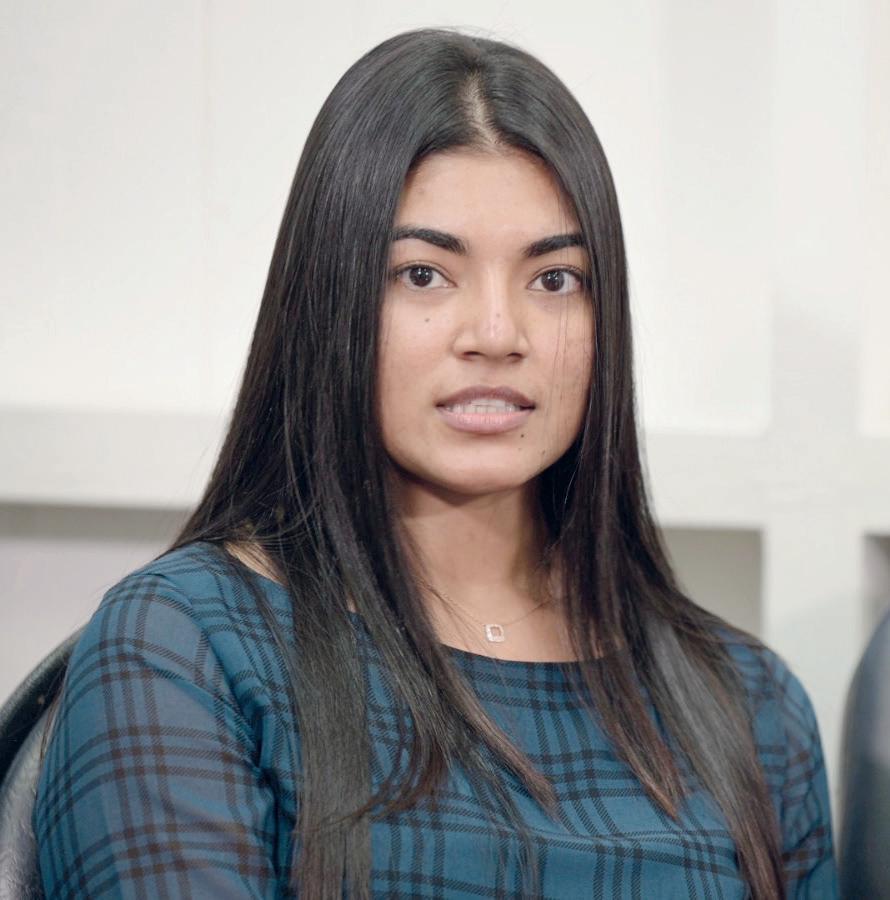
Dr. Kissoon, who hails from Sister’s Village, West Bank of Demerara, is one of six members of Guyana’s first all-female surgical team.
She began her career in medicine as a pediatrician at
GPHC after completing her medical studies at the University of Guyana in 2013.
“When I did my internship, pediatrics was one of my first goals; that was my first rotation and it seemed like the right fit because I enjoyed working with the kids. However, after being exposed to general surgery as an intern…I fell in love with the surgical field and I started working in the Department of Pediatric Surgery,” Kissoon shared in a recent interview with Guyana Chronicle.
Wanting to expand her expertise, Dr. Kissoon registered for the surgical programme at GPHC. However, her new journey had begun at a time when the world of medicine was plunged into a state of uncertainty with the advent of the pervasive Coronavirus (COVID-19) pandemic.
By Naomi Parris“It has been quite a journey because I started the programme at the onset of the COVID-19 pandemic, so the benefits and exposure were limited at that time. However, that rapidly grew and I have to say within the department we managed to overcome the obstacles during the pandemic and managed to get back on track.”
At the time, the world was at a standstill and many civilians and healthcare workers alike contracted the virus and unfortunately died.
Dr. Kissoon and many other health professionals stood on the frontline of it all.
Despite the challenges, she continued her journey and is now in her third year of the residency programme.
Reflecting on her childhood, Kissoon noted that growing up in a small rural community, there were not many role models to look up to. There was a time, she said, when many preferred the simpler country life.
“Growing up there and spending most of my childhood and adolescence there, we didn’t have anyone who did medicine and we haven’t had many who even came to the University of Guyana; now we have at least five persons, even within the
programme who did medicine and almost everyone is going to university and getting an education and [becoming] entrepreneurs,” she reflected.
Further, she said: “It doesn’t matter where you are coming from; just look at me. I’m from Sister’s Village on the West Bank.”
Now a role model and an advocate, Dr. Kissoon, along with her colleagues are lobbying for more women, especially

- GPHC’s stellar doctor says as she walks down memory lane
‘It’s not where you come from, it’s where you’re going’From left to right: Dr. Andrea Kissoon, Dr. Sabrina Rampersaud, Dr. Bibi Hussian, Dr. Sandy Solomon, Dr. Gabrielle DeNobrega and Dr. Katheen Ambrose Sister’s Village’s very own Dr. Andrea Kissoon. She is a member of the Georgetown Public Hospital Corporation’s first all-female surgical team (Samuel Maughn photos)
THE perfect example of the popular parlance, “as one door closes, another opens,” is the life of Litecha Harriram Constantine, an agricultural engineer and woman of many caps who traded her dream for a path that leads to great success.
Born and raised in Herstelling, East Bank Demerara, she moved a little further down the line to Diamond New Scheme, where she continued her formative years.
Growing up with a strong and independent mother, Suzie Harriram, who was an electrician by profession and her father Sundar Harriram, a cane cutter and bus driver, Constantine saw the importance of independence through the lens of her mother’s eyes.
After the completion of her secondary education at the Central High School in Georgetown, she applied to work at Giftland Mall as a cashier, but
in a scholarship to do agriculture engineering instead. Having no idea about agriculture, Constantine decided to put her dream aside to take up the offer and the challenge
in Cuba. There, she spent six years and completed her degree in
engineering, after which she returned to Guyana and was assigned a job at the National
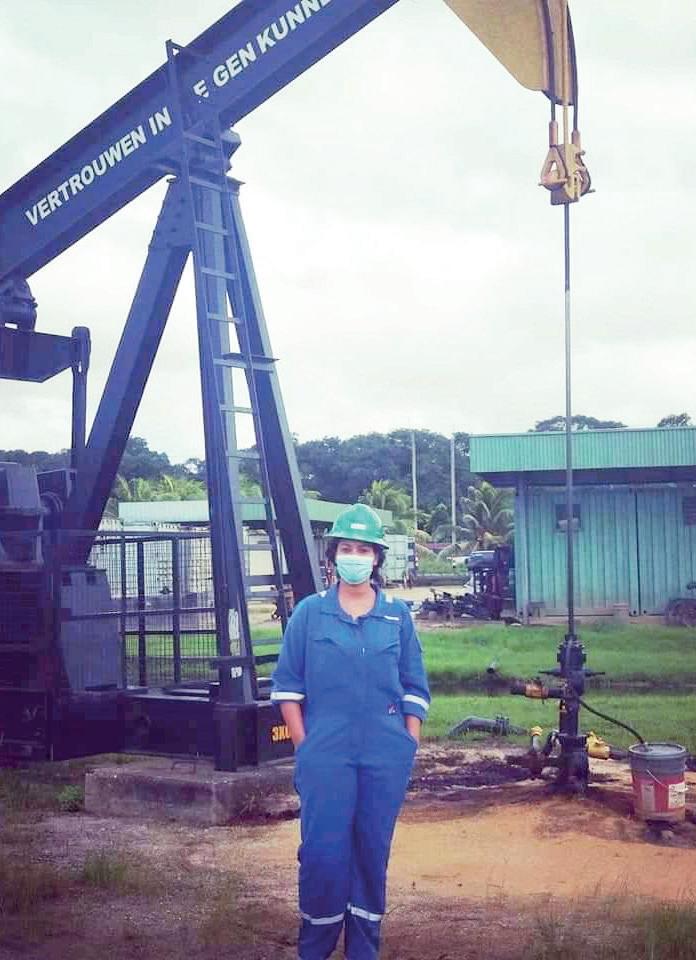

Drainage and Irrigation Authority (NDIA). Driven by her passion to constantly elevate herself,

her heart’s desire was to become a doctor.
Her intention was to elevate herself to a profession that would allow her to care for others and practically give back to society.
So Constantine started to enquire and a friend of hers, Kumar Jagasar, told her of a scholarship that was advertised in the Guyana Chronicle newspaper.
Feeling very optimistic, she jumped at the opportunity and applied for the scholarship to Cuba, but unfortunately, she was denied a spot in the medical field.
Unable to sustain such expenses on her own, the woman thought that her dreams were crushed, but little did she know that as that door closed, another was about to open.
She felt hurt and disappointed, but just when she thought that all was lost, she was asked if she’d be interested




FOLLOWING the lead of her brother, Dionne Stoll was able to realise her goal
of receiving certification in heavy-duty equipment operation through the Board of Industrial
abilities and expertise as an engineering student at the University of Guyana.
“I am just happy for myself, because this certification here is an additional ability in my field of engineering, and I see it as a method to extend my employment options in the working society,” Stoll said.
Training (BIT).
Stoll was one of several women featured on the BIT Facebook page following
their graduation from their respective programmes. She remarked that this achievement enhances her
It is for this very reason that she encourages people, particularly women, to take advantage of the government’s free hardskill programme in order to empower themselves and enhance their livelihoods in order to contribute to the
growth of the country.
“I witnessed the same amount of ladies as guys taking training in this particular programme, and it brought tears to my eyes, because that indicates how far we, as women, have come to be a part of a maledominated profession. I also hope that other ladies will make us proud,” she told BIT’s Public Relations Department.
To that end, Stoll thanked the agency for providing her with the opportunity to enhance her knowledge and abilities in order to help her finish her university studies.
Richardson’s desire to become certified in Welding and Fabrication has come true, despite her initial apprehension about enrolling at the Board of Industrial Training (BIT).
“I can’t believe I’m one of thousands who received a certification from the Board of Industrial Training and that it only took me scrolling through my Facebook page to locate the agency’s advertisements,” the resident of Linden recently told a BIT’s representative.
She went on to say that after looking through the agency’s Facebook page to see what it had to offer, she decided to take advantage of the free government training programme.
According to the Ministry of Labour’s training unit which has been regularly featuring women graduates on its Facebook page, Richardson noted that this was her finest decision yet because the BIT allowed her to learn numerous techniques and abilities that she can ap-
ply in her everyday activities.
She also expressed gratitude to her programme’s instructor for believing in her and offering much-needed assistance in completing the demanding programme.

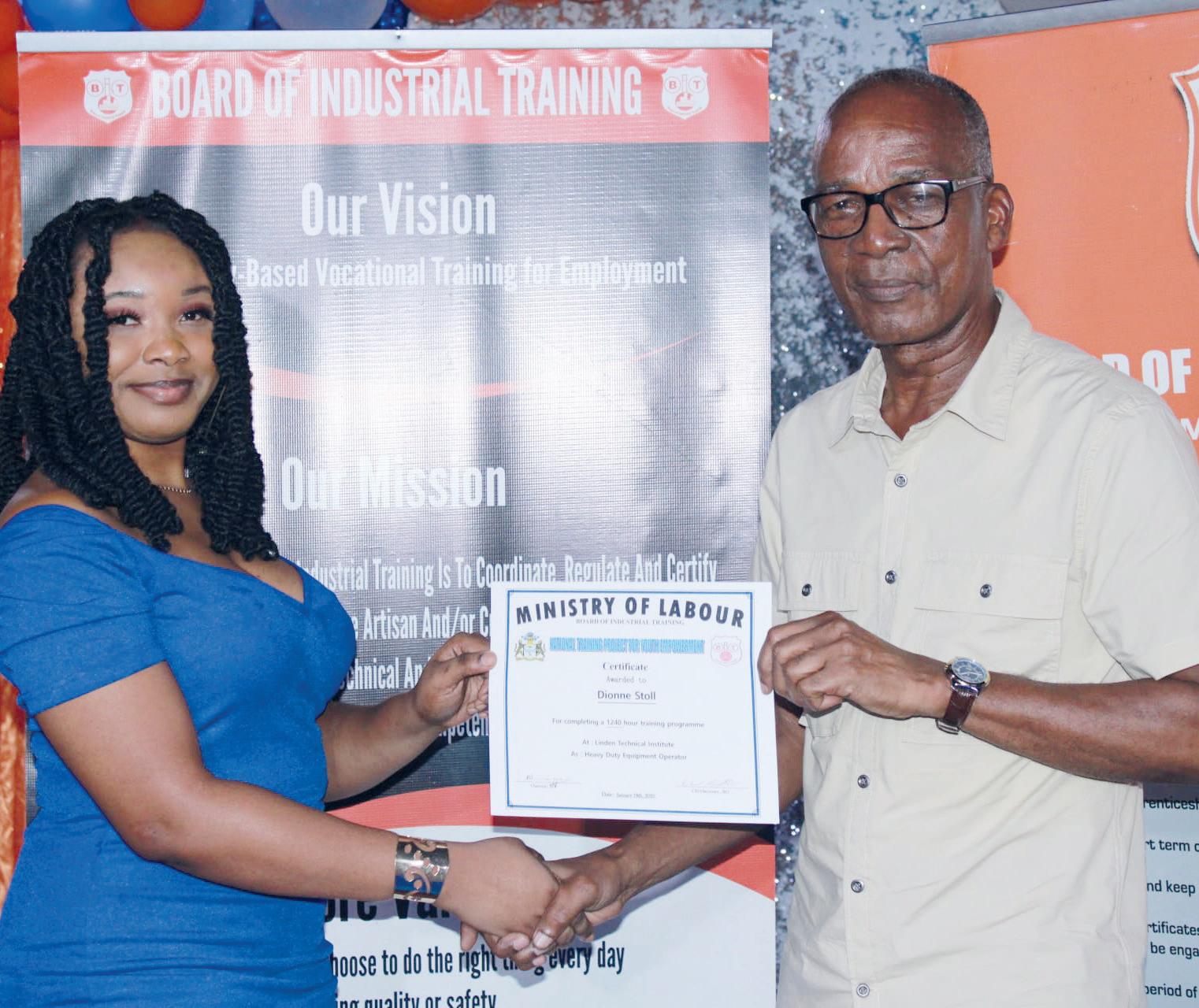
She said that the programmes offered demonstrates the government’s commitment to providing its citizens with the essential skills and knowledge to enable them to participate effectively in the country’s progress.
Richardson said she intends to open the doors to her own business as soon as she is able to finalise some details.
This step will not only allow her to become her own boss, but it will offer much-needed jobs in the community.
“I believe that starting my own firm would benefit everyone involved,” she said.
She used the opportunity to advise persons to take up the free training opportunities, so that they too can achieve success in life.

ALINDEN mother and her two daughters, amidst self-doubt and fear of the unknown, were able to complete the Heavy-Duty Equipment Operation (HDEO) programme offered by the Board of Industrial Training (BIT).
The trio recently graduated, and was interviewed by the agency’s public relations department. Their stories were published on BIT’s Facebook page.
Becoming certified as a heavy-duty equipment operator has not only reinforced Leesa Thorne’s career at the agency, but it has also opened the door to many opportunities.
Thorne was one of 131 Lindeners who received certification from BIT on February 24, 2023 at the Lichas Hall.
The mother of six remarked that her decision to learn another useful skill was influenced by the remarks of Minister of Labour Joseph Hamilton.
According to her, his advice to individuals to acquire several skills in order to increase their marketability in the country’s labour sector sealed the deal.
With this in mind, she regarded her experience as somewhat difficult but worthwhile, since one must be focused and determined in order to achieve their final goal.
“Being a mother of six, I understand the value of education in today’s culture, and how far it can take you. I would encour-
decided to enroll in this intense programme in 2022.
“When I first started this programme last year, I had no idea how I’d manage to attend classes while also working; I surrendered the entire situation to God. It was grueling, challenging, and ultimately rewarding, since now I can celebrate my magnificent feat of being an operator,” Shenieka said.
This achievement, she claimed, is also owed, in part, to the support of her mother and sister, who were able to assist her along the journey when it got incredibly tough to continue.
WOMEN worldwide will be celebrated today when International Women’s Day is observed and what better way to include and advocate for equality among the genders than through this year’s theme, “DigitALL: Innovation and Technology for Gender Equality.”
The Guyana Chronicle recently spoke with Andreasa Morris-Martin, a lecturer attached to the University of Guyana’s Faculty of Natural Sciences: Computer Science Department. She was once a student there and is now the head of department.

Morris-Martin’s journey in the world of technology began while she was still in secondary school.
age people, including my own children, that there is no age at which they should cease taking advantage of educational opportunities,” Thorne was quoted as saying.
She had the opportunity to acquire training and certification alongside her two daughters, Simone Thorne and Shenieka Thompson.
Simone told BIT officials that she was nervous about the HDEO programme, because it was completely out of her comfort zone. Yet, knowing that her mother and sister would be there to share the experience with her, she does not regret her decision, because it opened her eyes to a new world.
“I am now working as a Customer Service Representative at
a call centre, which I truly enjoy, but this programme is where my heart is at now, you know. I truly loved my time at the Board of Industrial Training, and I can’t wait to see how I can put my skills to use,” Simone said.
Simone emphasised the numerous options that are available to those who become certified professionals after finishing any of the programmes.
As a result, she urged people to grasp the advantages of learning technical skills in order to work in the country’s oil-and-gas business.
Shenieka, on the other hand, decided on the HDEO programme after a close friend was accepted in 2021. His experience, she claimed, piqued her interest to the point where she
Shenieka aims to seek work for this job to fine-tune her talents, and to learn new techniques now that she has the requisite skills to operate and control such machinery.
She expressed gratitude to the Board of Industrial Training for providing her with the chance to become a qualified heavy-duty equipment operator at no cost.
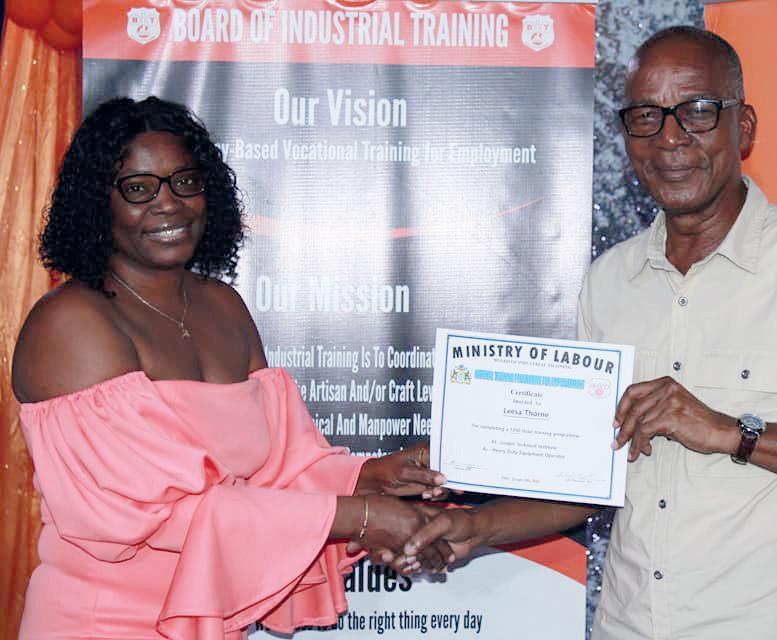
“If I can accomplish it, every other individual, either young or elderly, can do it as well. You will have difficult days throughout training, but remember that these abilities will be with you for the rest of your life,” Shenieka stated.
Their adventure at the agency, however, does not finish here, as they intend to return to be trained in areas that will complement their existing skills.
“It was either in first or second form and one of my teachers, Ms. Tessa Hoyte had encouraged me and my friends to pursue Information Technology,” she recalled.
From that point on, she noted that she continued to pursue Information Technology (IT) and wrote the subject at the Caribbean Secondary Education Certificate (CSEC) level.
She stated that after this, she became even more interested in a career in technology and although she was not sure what to expect, she went on to the University of Guyana where she graduated in 2008 as the first “Best Female Graduand”.
During the interview with this publication, she emphasised that no one is excluded from having a career in tech-
nology.
“Anybody is able to study technology at university. It all depends on what the requirements are to get into the course. As long as you have those, you’re free to study in that field,” she said before advising that persons shouldn’t ever limit themselves.
“Don’t assume the cliches when choosing a career,” she said.
In Guyana, there are several companies and organisations such as STEM Guyana, Girls in Tech, the Guyanese Girls Code programme, and last but not least, the University of Guyana’s Robotics Club that help to nurture and mold minds interested in technology.
These clubs and programmes provide young people with the opportunity to pursue a career in technology, which emphasises Morris-Martin’s point that “no one is left out in technology.”
THE Guyana Agricultural and General Workers Union (GAWU) has emphasised that International Women’s Day (IWD) is a day to celebrate and recognise the incredible contributions working women have made and continue to make in our country and around the world, and to regroup to face the challenges ahead.

In a statement to mark the occasion, the union noted that since the pandemic began, we have been overwhelmed by changes to our daily lives and to the way we work.
“In many ways, society is forever changed and markedly different from what it was even three years ago. As we mark International Women’s Day, we are reminded that in times of societal change, we need to push for those changes to be inclusive and equity-driven to move us closer to a more equal world.
We remember that International Women’s Day is rooted in the collective action of working women who came together on March 8th for gender equality, and for social and economic justice for everyone. Today, much work remains to be done to ensure spaces are accessible to all women; non-binary, and ‘trans’ equally. This includes the digital space.”
The union said that the United Nations is observing IWD with their chosen theme: DigitALL: Innovation and technology for gender equality and in their statement said that this aligns with the priority theme for the upcoming 67th Session of the Commission on the Status of Women, “Innovation and technological change, and education in the digital age
for achieving gender equality and the empowerment of all women and girls”.
According to the union, this message simply means that “we must use technology to advance gender equality.”
While technology and online spaces have brought opportunities to build sisterhood in solidarity, they have also opened the door to anonymous and targeted gender-based violence and harassment, the union said in its statement.
“The unrestricted sharing of information also allows misogynist groups to thrive despite their hateful messages
that are harmful and hurtful to the lives of women, girls, and gender diverse people. Women are more likely to face sexual harassment, cyberstalking, cyberbullying and other forms of online abuse. This can cause fear and anxiety, limiting their ability to participate in online activities and often spills over into their lives away from technology.
Where technology can be healing and helpful is when it helps us build connections and communities. Women now have more access to resources and information, allowing them to make more informed decisions about their lives and learn from each other’s struggles and to support feminist campaigns around the world. Women in Iran and Afghanistan are facing extreme risks to their lives as they strive to claw back their autonomy and their right to education from oppressive, authoritarian governments. Women in the United States are waging a battle to reclaim their reproductive rights following the devastating overturning of Roe v. Wade,” the statement said.
It noted that the International Women’s Day organisation is also reminding us today to ‘Embrace Equity’.
“We welcome everyone into every space and raise awareness about discrimination, in all its forms. Today we celebrate the amazing achievements of working women who are making a positive difference in the world. Let us take the opportunity to applaud the women trailblazers, supporters, nurturers, activists and fighters in our lives, near and far, and thank them for all they do,” the statement added.
NOTING that digital technology is becoming part of the fabric of our everyday lives, the Women and Gender Equality Commission (WGEC) has underscored how critical it is for women and girls to be part of shaping technology.
“Bringing women and other marginalised groups into technology spaces will result in more creative solutions. It will have greater potential for the creation of innovations women and girls need and want to use in their lives,” the commission said in a statement to mark today’s observance of International Women’s Day.

The day is used annually to increase awareness and celebrate the social, economic, cultural, and political accomplishments of women.
This year it will be observed under the theme, “DigitALL: Innovation and technology for gender equality,” which serves to honour and celebrate the women and girls who are leading the charge for development of transformative
technology and digital education.
The WGEC pointed out that we live in a world where increasingly, transactions of our lives are informed by technology, more so by digital technology.
It was explained that in urban spaces, life without electricity is almost unthinkable and that for our youth, life without internet connectivity would be torturous.
The organisation pointed out how the COVID-19 pandemic has widened the digital gap.
“The COVID-19 pandemic whilst wreaking havoc on lives around the globe, highlighted how great the disparities are, particularly between urban and rural populations. Rural women and girls have less access to the digital world and benefit less from the solutions it provides than comparative to that of urban women and girls. The pandemic also brought about innovation. We all learnt how to do work, learn and entertain ourselves in new ways,” the statement said.
It pointed out that this year’s
IWD theme also forces us to examine the impact of the digital gender gap on widening economic and social inequalities, as well as the importance of protecting the rights of women and girls in digital spaces while addressing online and ICTfacilitated forms of gender-based violence.
It was pointed out that technology-assisted forms of gender-based violence need to be adequately addressed.
The statement said that in addition to the full participation of women and girls, efforts need to reduce the disparities that exist.
“To truly extract the benefits new technology promises, the full participation of women and girls in STEM and technology spaces must be supported. We need to foster the environment where technology is created that meets the needs of women and girls. We need to examine ways to reduce the growing disparities between men and women in terms of access to and proficiency with digital technolo-
gies,” the statement said.
It added that the digital space has generated unprecedented opportunities for the empowerment of women and girls through opportunities for online learning, digital activism and networking with virtual communities of practice to the rapid expansion of lucrative technology jobs and careers.
“Women and girls remain under-represented across the creation, use and regulation of technology. They are less likely to use digital services or enter tech-related careers, and significantly more likely to face online harassment and violence. This limits not only their own digital empowerment, but also the transformative potential of technology as a whole,” the statement added.
Further, it stated that this year, the commission is continuing its sponsorship of three women who are pursuing studies in STEMrelated areas at the University of Guyana through its annual Magda Pollard Women in STEM Scholar-
ship Programme.
“We celebrate the strides made by organisations like [sic] STEM Guyana, and ICT for Girls and the CARICOM Girls in ICT Initiative, but the advancing technology has also introduced new forms of inequality and threats to the well-being of women and girls. The commission is acutely aware the increasing incidents of cyber-bullying, cyberstalking and grooming as evidenced by the number of reports engaging the office of the Director of Public Prosecution. Whilst Guyana has new cybercrime legislation, the commission feels more needs to be done to curb new and emerging forms of violence.
The statement said that women and girls need to have the assurance that they too are entitled to have safe lives and strong futures.
“We cannot allow technology to widen existing disparities, but rather we must put it to work on behalf of a safer, more sustainable, more equitable future for all,” it added.
FROM PAGE 5A
Constantine did not settle there in her position; she moved on to the Agriculture Sector Development Unit, where she worked on the foreign-funded projects. During that time, she was also studying for her MBA in oil and gas management.
Today, the 32-year-old, a proud wife to her supportive husband, Dr. Mark Constantine, head of the Ministry of Health’s Psychology Department of Training and Education (Mental Health Unit), she is an engineer employed at NDIA.
She operates in the areas of project monitoring, inspections, mechanical equipment repairs and maintenance and she is also a proud holder of an MBA in oil and gas management.
But Litecha is not quite finished with studying as yet. In fact, according to her, she’s just getting started with her professional achievements.
This future thinking woman is on the verge of completing her second master’s degree (public policy and administration), along with her PHD in business.
Litecha said: “My job gives me the most wonderful experiences as I get to be involved in a lot of field activities and
FROM PAGE 4A
hands on approaches. Prior to this employment, I worked as an engineer for Schlumberger in the wireline field, where I had the privilege of visiting and working in the United Arab Emirates.
“I must say that this was a wonderful experience, hopefully not once in a lifetime. I further spent time in Brazil and Suriname. These experiences add up to create unforgettable memories. I enjoyed my time in the oil sector, and as a woman, I can honestly say I faced zero discrimination or gender bias while working there. I love my job.”
“I believe strongly that a woman has her roles to play in this world, but you are not limited because of gender. With the right attitude, faith and perseverance, nothing is impossible.
“Sometimes we tend to weigh ourselves down with our own insecurities and what society thinks. Who cares what society thinks! Be you, be proud, be positive, wear that dress and pop, and I can assure you the outcomes will be in your favour,” said Mrs. Constantine.
young women, from all parts of the country, to consider the sciences.
“In the field of medicine and especially so in surgery, its rapidly changing and Guyana is moving and within the last decade…I mean I have been at GPHC almost a decade now as an employee and you have seen the advancements and we have seen how much we have been doing … we can match the Caribbean and even a first world country,” she said, further referencing the country’s first all-female surgical team.
“I don’t think we would have ever thought at one point in our lifetime that we would be a part of a team that is all female. Being a student, being an intern, we would have been surrounded by many personalities, most of which are males, who would have been great role models, but it’s quite historical that we can sit here and actually explain why it’s an experience to be a part of an all-female team.”
She said the team represents the future for all Guyanese women, from those on the coastland to those stretching across the vast savannahs.
Women like Dr. Kissoon continue to make significant contributions to medicine in a variety of areas thus leading the way in improving healthcare outcomes for all citizens.
Despite many challenges, women in medicine continue to be trailblazers and role models for future generations. Their contributions have helped to improve healthcare and have inspired countless others to pursue careers in medicine.
As the work towards a more equitable and just society continues, it is important to recognise and celebrate the achievements of women in medicine and to support their ongoing efforts to improve the healthcare sector.
opportunity to shine in areas that they want to, or to apply for things that they want,” Ferrell said.
With a background in HR, Ferrell is able to implement management strategies that not only benefit the company but also its employees, and this was evident during the Coronavirus pandemic.
“I always say COVID even though a lot of bad things happen; it was still a little blessing in disguise because EDO would have rolled out our work-fromhome programme. Right now we have a hybrid system. As of March 2020, the employees work from home for the most part.
“We only went to the office as required if there is something that has to be held with someone or you know, we deliberately set off his days. We do not go into work five days a week,” she said.
According to the EDO head, this flexibility is important for women who have children and families of their own.
“They have praised the company time and time
again because it has allowed them to spend more time with their children to ensure that they get them ready for school,” she stressed.
Ferrell said that one of the major misconceptions about the oil and gas sector is that it is primarily for men. This, however, is far from the truth; it also includes women who play a vital role in the field.
Women who work in the industry face unique challenges and opportunities. They have to be highly skilled and trained to handle the complex machinery and equipment used in drilling and exploration.
These women are involved in various aspects of the industry; from exploration and drilling to refining and distribution.

In addition, they work in various roles such as engineers, geologists, technicians, and managers, just like Ferrell.
The contributions of these women in the oil and gas industry are significant, and they continue to play an important role in the growth and development of the sector.
